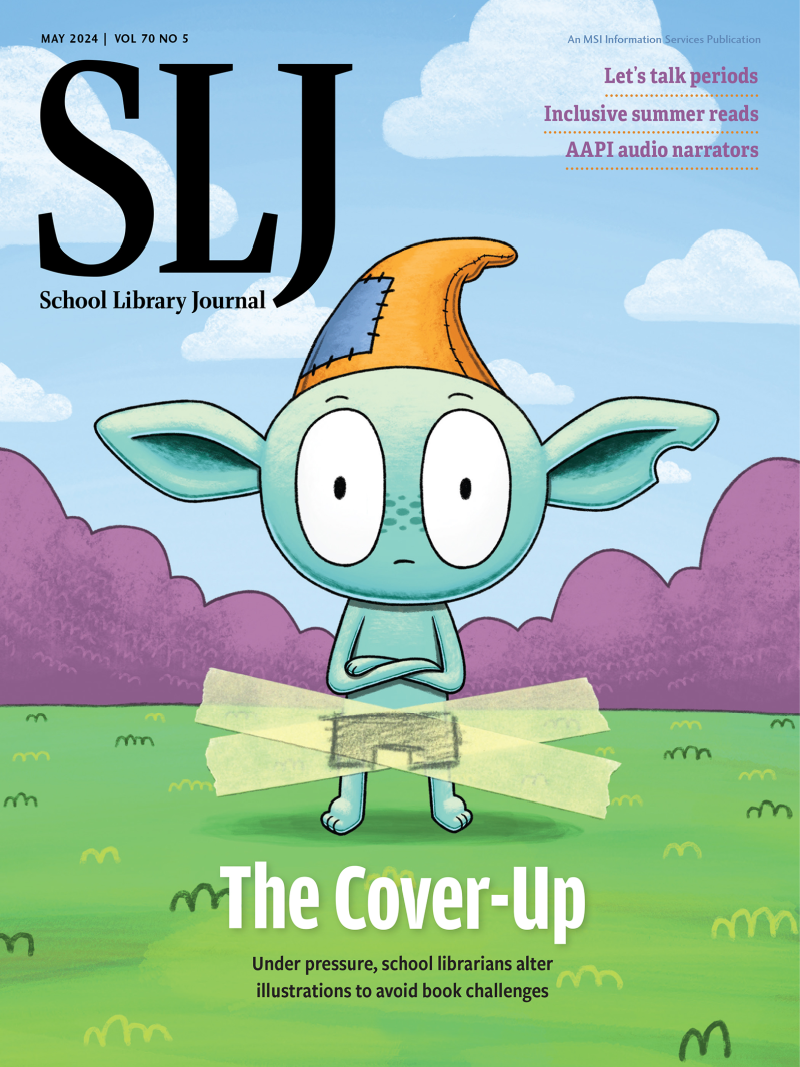Beware Workarounds. Attempting to Appease Censors, Libraries Risk Compromising Values. | From the Editor
To fathom the defacing of images in children’s books, one almost has to process it in stages, beginning with incredulity. The issue, however, is no joke, and librarians are feeling the pressure. In our reporting, the frequency of instances involving the altering of material by school librarians was such that we elevated this to a cover story.

We’re pleased to feature on this month’s cover: Gilbert.
Alex Willan, the goblin’s creator, accepted the assignment from Mark Tuchman, SLJ’s creative director.
This time, the author/illustrator of the picture book Unicorns Are the Worst! altered his own creation, tacking modesty shorts onto the character, who, as originally rendered, appears in the buff.
It’s an absurd notion yet all too real. (See our lead feature, “The Cover-Up” by Andrew Bauld) The same drawn-on bottoms now adorn every copy of Unicorns in the Indian River (FL) school district.
Jennifer Pippin, president of the local Moms for Liberty chapter, spurred the move. Late last year, she claimed the goblin nudity was “harmful to minors” in a book challenge spree that called out hundreds of titles for sexual content. With Florida law to back her, here we are.
To fathom the defacing of images in children’s books, one almost has to process it in stages, beginning with incredulity.
“My first reaction was, ‘seriously?’ ” Willan told our reporter. “I think it’s important to note that there’s nothing inherently sexual or pornographic about nudity,” moreover, goblins aren’t real. And, to state the obvious, Willan added, “Butts are funny.”
The issue, however, is no joke. Librarians are feeling the pressure of book challenges and onerous district policy, if not statewide legislation. In our reporting, the frequency of instances involving the defacement of books by school librarians was such that we elevated this to a cover story.
One might be tempted to vilify these individuals. Those who spoke to Bauld for our story—all did so anonymously—felt driven to this action by their circumstances. Each case is legitimately fear-inspiring.
Mission creep
For another perspective, I turned to Brandi Cummings, assistant director of Kenosha (WI) Public Library, who presented a program at the Public Library Association conference in April entitled “How To Say the Hard Things: Lessons Learned in Years of Crisis.”
What strikes her about these incidents? The depth of librarians’ care in connecting people with books. “To the point that they believe in the power of what’s inside of that book so deeply that they’re considering altering the outside to make it more appealing to people,” she says.
As in her presentation, Cummings has a larger thesis. “We, as a profession, have leaned too heavily into compromise when really we need to learn to live in that conflict. It’s so hard, especially as libraries have had such mission creep. We really have been a fix-all for our communities, for our schools, for the people we serve,” she says.
“That shows up in decisions like [marking up books] because we’re trying to find a way to make it work.”
So what does living with conflict look like? From a public library perspective, keeping in close communication with staff toward a solid, mutual understanding of the library’s mission and values, its policies, and what that looks like in practice. School libraries may benefit from a peer-to-peer network. They have formalized one among school and public librarians in Kenosha, where they’ve gathered over strategy to deal with book challenges. “One, it gives you a safe space to process and that’s what a lot of us need,” says Cummings.
It all comes back to the values of the profession, which mirror the core ideals of our culture, including equitable access. School librarians need our support to fulfill their responsibility to students. This includes the active, ongoing involvement of their professional associations—national, state, and local.

RELATED
The job outlook in 2030: Librarians will be in demand
The job outlook in 2030: Librarians will be in demand
ALREADY A SUBSCRIBER? LOG IN
We are currently offering this content for free. Sign up now to activate your personal profile, where you can save articles for future viewing






Add Comment :-
Be the first reader to comment.
Comment Policy:
Comment should not be empty !!!